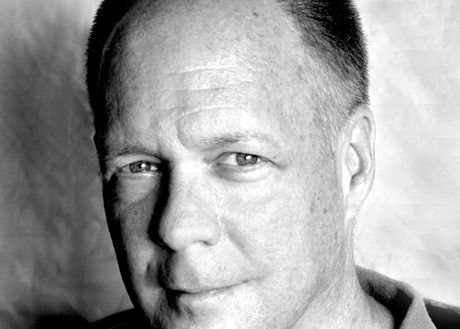Twelve Questions for David Baker
On outward symbols of inner coupling and the imagination's powerless power.
BY The Editors

Few poets writing today are so closely identified with a place as is David Baker, who makes his particular locale—the Midwest—into a mirror for the human experience on a universal level. This Friday, the non-profit Open Books will welcome Baker to one of the Midwest’s most prominent cities: Chicago. Baker will be reading from his most recent book Never-Ending Birds as part of the Poetry Foundation’s Poetry Off the Shelf series. Baker took time out from his current book tour answer 12 questions about his work, his locale, and his affinity for lava lamps.
What’s the first poem you remember reading?
Something by James Whitcomb Riley, I’m afraid, when I was maybe seven or eight. Then everything Seuss. I don’t remember much poetry after that until high school, but then I read The Canterbury Tales as a junior or senior and it all seemed fabulous to me. That poem still seems fabulous, in fact. And quickly after, I found John Donne and Emily Dickinson and loved the rich densities, and equally rich clarities, of those two poets.
What did you eat for dinner last night?
I made—for my 18-year-old daughter, Katie, and me—crab cakes on a bed of spinach leaves. Brown rice. Spring vegetables sautéed in olive oil.
Is there truth in poetry?
Uh-oh. This sounds like one of those it’s-two-in-the-morning-get-the-lava-lamp-out kind of questions. I don’t want to give a glib answer to the question, but the question is so massive and impossible that I am tempted to start with exploring what truth is, what poetry is, what is is, and so on. I will not.
So, instead, of course there is truth in poetry. There is also fiction in poetry. Those are not antitheses.
Likewise, there is beauty and wisdom and horror and erasure and radical interiority and powerful connectivity, all at once. That’s the special gift of the art.
Which poet do you most admire?
We all have our lists. Mine changes constantly. I admire poets for the work they do and the readers of poetry for theirs. To write poetry is to place one’s faith in music and mystery and magic and difficulty—a commitment to the imagination’s powerless power and to freedom of all kinds—and also in the long-range hope that the work of poets matters to a culture as well as to an individual. I admire poets especially who do not so much write for a wide audience as a long one.
What’s your favorite word these days?
Spring.
What’s the most interesting place poetry has ever taken you?
It’s a tie. Bucharest, Romania, and Granville, Ohio.
Who’s your favorite Chicago poet?
How do you feel about rhyme?
Uh-oh. Lava lamp time. Rhyme is one of the fundamental defining characteristics of poetry and one of the most enchanting devices of poetry’s musicality and mnemonic power. It moves throughout the line, across the lines, inside the lines, down the lines; it helps to shape the lines, and argues with and complicates the very syntax and meaning of a poem’s rhetoric.
And of course, the absence of rhyme denotes a poem’s (and a poet’s) relationship to rhyme and tradition—or at least some traditions, for of course, some cultures’ poetry has never rhymed. Rhyme’s absence can be politically powerful, and of late, it can seem devolved, merely an age’s habitual style. Some poets hold that forsaking rhyme is a form of resistance, and I understand that. I also think that’s a fairly flimsy remnant of a once-powerful aesthetic stance. A few of my favorite contemporary poets rhyme. Most of my favorites do not. I do very rarely. I am interested in distributing the musical powers of poetry throughout the line, in both sonorous and discordant ways, fluid and fractured ways, by turns.
I do think it’s useful to remember Robert Frost’s ideas about the relation of rhyme to metaphor and troping, that fundamental magic of association and connection (and sometimes disconnection) that poetry is so much about. To paraphrase Frost: Rhyme is an outward symbol of an inner coupling, putting this and that together.
If you could take one book with you on a desert island, what would it be?
Something with a lot of pages to start fires with.
What do you plan to do while you’re in Chicago?
I’m going to see some friends and try to visit the Field Museum of Natural History, one of my favorite museums in the country.
What’s on your iPod?
I don’t have an iPod. Nor do I text, tweet, Skype, IM, or know how to take photos with my cell phone—much to my daughter’s alternating amusement and ridicule. But on my stereo at home, a six-disc changer, I currently have Ella Fitzgerald and Joe Pass’s “Again”; Steve Reich’s “Octet”; Henri Salvador’s “Room with a View”; Bireli Lagrene’s “Django Generation” (first disc); a blank spot; and right now, as I type these responses, the sixth disc is playing Bruch’s violin concertos.
What’s the last poem you read?
“Power Point III” by Khaled Mattawa.
The editorial staff of the Poetry Foundation. See the Poetry Foundation staff list and editorial team masthead.


